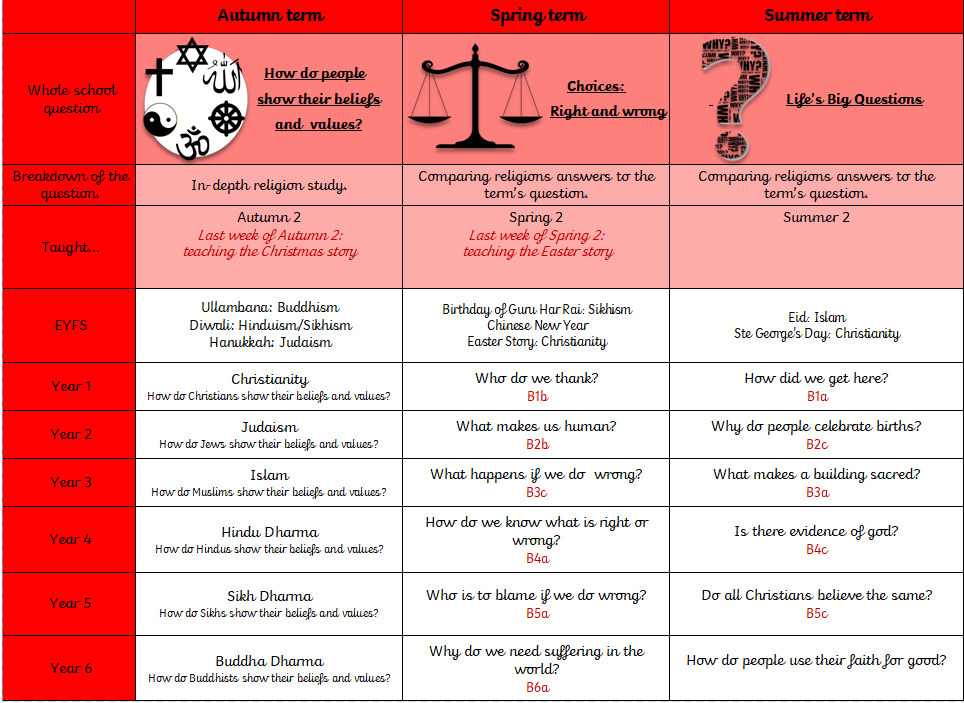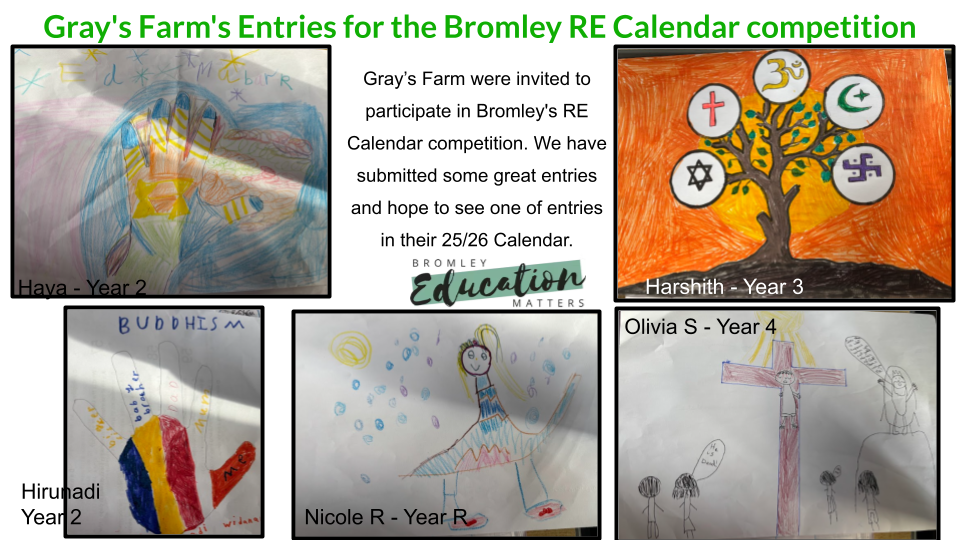RE
Religious Education … is intellectually challenging and personally enriching. It helps young people develop beliefs and values, and promotes the virtues of respect and empathy, which are important in our diverse society.
(Ofsted Religious education: realising the potential. 2013)
At Gray’s Farm, we believe that the teaching of Religious Education is a key part to a child developing a well-rounded, non-judgmental view of the world around them. We place an importance on the teaching of RE as we believe it is significant to know about the faiths of others - especially in a time where our children are growing up and will continue living in a diverse and cosmopolitan society. We also take pride in the diversity we have in our school and make every effort to allow our staff and pupils to share their knowledge and expertise. Through the teaching of Religious Education our children are able to ask and answer challenging questions about meaning and purpose in life, beliefs about God, ultimate reality, issues of right and wrong, suffering in the world and what it means to be human. We give the children opportunities to learn about, and from, religions and worldviews in local, national and global contexts, to discover, explore and consider different answers to life’s questions.
We have developed a bespoke Religious Education curriculum (based on the Bromley syllabus) to promote diversity and acceptance, celebrate cultural differences and to challenge stereotypes through a deeper understanding of others beliefs and ways of living. Our curriculum allows children that have a religious belief to celebrate their beliefs and to create understanding and acceptance from their peers as well as creating opportunities for pupils to break stereotypes and address common misconceptions. Throughout the year, teachers will make links to religions in all areas of the curriculum (for example: the destruction of the monarchies in History and the key beliefs of countries studied in Geography.) As a school, we also learn about and celebrate the key Christian festivals during the year, working with our local church and community.
An overview detailing our RE coverage for each year group from Nursery to Year 6 can be found

During the autumn term, all children participate in an in-depth study of the six major religions. This allows our children the opportunity to experience and understand the key information of these religions before they leave in Year 6. Each year group’s in-depth study will explore these key areas: Significant person/people, the sacred building / holy book and religious festivals.
Across the spring and summer terms, children learn from these religions by investigating how they each respond to some of life’s big questions. The children will use their P4C skills to participate in debates and discussions as well as having an understanding of different religion’s views on a subject. This will result in them drawing their own conclusions based on their own beliefs and opinions as well as the information gathered in the RE lessons. These opinions will be formed through: questioning; whole class teaching; understanding religious practices and ways of living; evaluating sources and artefacts; articulating personal beliefs and values while respecting the right of others to differ from their own.
In our EYFS classes, our children explore and celebrate different religious festivals throughout the calendar year. They are encouraged to ask questions about cultures and religions that differ to their own; discussing similarities and differences between themselves and others, and among families, communities and traditions. We often use stories as a stimulus to support this learning and activities completed help our children to understand that not everybody believes the same and that this is something that we should be proud of and celebrated. The festivals that are celebrated are all linked to (but not exhaustive of) the 6 key religions explored in KS1 and KS2.
Harvest Festival
At Gray's Farm we celebrate the Harvest Festival at the end of September. We have a whole school assembly where we learn about the origins of the Harvest festival and what it means to Christians. We bring donations for local food charities so that we are giving to the poor in our area. We often have a minister from a local church who comes and takes part in our assembly.
RE Calendar Competition
SEND - Ambition and Access in RE
|
Ambition – What are we aiming for children with SENs to achieve in this subject? |
Access – What amendments are made to the subject in order to help children with SENs to achieve? |
|
|
